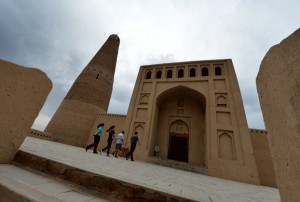China Clamps Down on ‘Underage Religion’ Among Muslim Uyghurs
RFA, 31 October 2014
 RFA Uyghur Service – Chinese authorities in the troubled northwestern region of Xinjiang have tightened up rules forbidding anyone under the age of 18 from following a religion, targeting families whose children study the Quran or fast during the Muslim holy month of Ramadan with hefty fines.
RFA Uyghur Service – Chinese authorities in the troubled northwestern region of Xinjiang have tightened up rules forbidding anyone under the age of 18 from following a religion, targeting families whose children study the Quran or fast during the Muslim holy month of Ramadan with hefty fines.
Authorities in the Hotan, Kashgar, and Aksu prefectures of Xinjiang are increasingly forcing parents and guardians of the ethnic minority, mostly Muslim Uyghur children and teens to sign pledges promising not to allow them to take part in any religious activity, the exile World Uyghur Congress (WUC) group said on Thursday.
According to WUC spokesman Dilxat Raxit, the policy was previously rigorously enforced only for the children of Uyghur civil servants.
“It’s not just officials in particular now. The entire education sector is putting coercive measures in place,” Raxit told RFA’s Mandarin Service.
“There is now a political campaign under way in all areas aimed at forbidding Uyghur students from practicing any religion,” he said.
Pledges required
Staff in educational institutions are also being required to sign pledges to avoid any sort of religious activity, Raxit said, citing sources on the ground in Hotan, Kashgar, Aksu, and Ili prefectures, as well as the Silk Road city of Turpan.
“Those who break their pledges get fired from their jobs … or fired from their jobs and have a fine imposed on them,” he said.
An official who answered the phone at the Hotan government education bureau confirmed the rule.
Asked if the government’s stance had got tougher, he replied: “Yes, some areas are tightening up the rules.”
But he declined to comment further.
Wide-ranging restrictions
A Xinjiang resident surnamed Zou said that restrictions are much more wide-ranging in practice.
Uyghurs often still need the permission of their employers to practice as Muslims or to join a mosque, even after 18, he said.
“There are people working for certain employers who aren’t allowed to have a religion or to belong to a mosque,” Zou said. “But there’s not much they can do to control it among people who live in the countryside, or ordinary people.”
Raxit said such curbs on the practice of Islam are only likely to result in more violent backlash against Chinese Communist Party rule in Xinjiang, where many Uyghurs already complain of ethnic profiling for security checks and curbs on their freedom of peaceful expression and religious belief.
“People will use any method they can to defend their own religious beliefs,” Raxit said. “Recently we have seen a number of violent incidents, with deaths and injuries [among Han Chinese and Uyghurs].”
“All of them are linked to China’s repressive religious policies.”
‘Heavy-handed rule’
Rights groups accuse the Chinese authorities of heavy-handed rule in Xinjiang, including violent police raids on Uyghur households, restrictions on Islamic practices, and curbs on the culture and language of the Uyghur people.
Chinese authorities in the troubled northwestern region are targeting Uyghurs for special security measures in a major “anti-terrorism” campaign ahead of an Asia Pacific Economic Cooperation (APEC) leaders meeting in Beijing on Nov. 10-11.
Earlier this month, two Uyghur men went on a stabbing spree in Xinjiang’s southern district of Hotan, killing three police officers and three government officials before they were gunned down by the authorities in the latest violence to hit the troubled region.
The slayings came amid an anti-terror campaign launched in Xinjiang following deadly attacks blamed by Beijing on Uyghur separatists and Islamist insurgents seeking to establish an independent state.
Reported by Qiao Long for RFA’s Mandarin Service. Translated and written in English by Luisetta Mudie.
http://www.rfa.org/english/news/uyghur/underage-10302014120731.html

